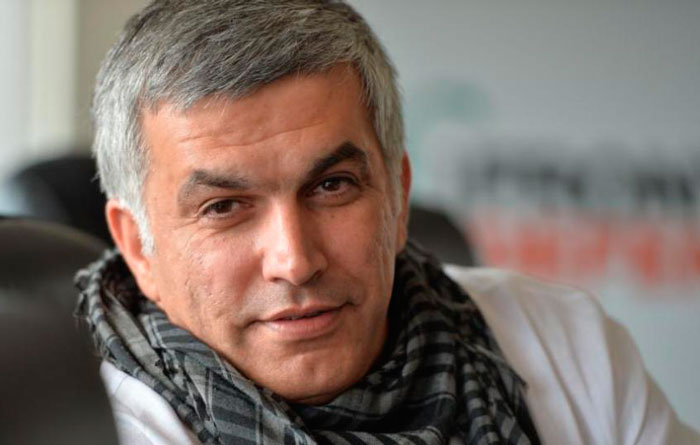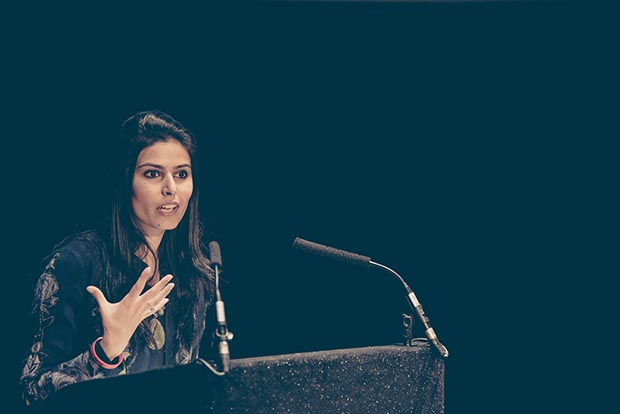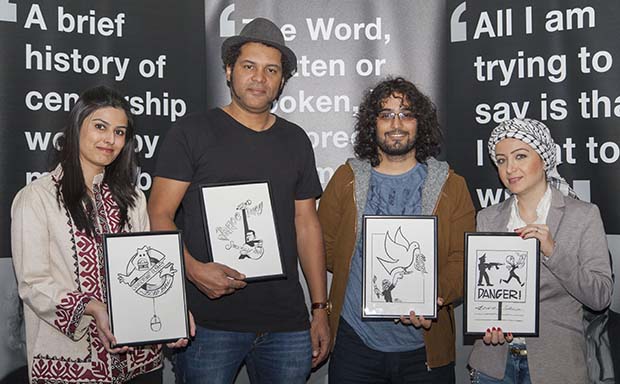28 Oct 2016 | Bahrain, Bahrain Statements, Campaigns, Campaigns -- Featured, Statements

To: Federica Mogherini
High Representative of the European Union for Foreign
Affairs and Security Policy and Vice-President of the
European Commission
European Commission
Rue de la Loi/Wetstraat 200
1049 Brussels
Dear HR/VP Federica Mogherini,
The Government of Bahrain continues to arbitrarily detain Nabeel Rajab, president of the Bahrain Center for Human Rights, founding director of the Gulf Centre for Human Rights and Deputy Secretary General of FIDH, on charges related to his rights to free expression and his work as a human rights defender. We write to ask you to publicly speak out against this clear violation of human rights, and to make clear the European Union’s stance on Rajab’s case and the human rights crackdown in Bahrain.
Rajab’s hearing is scheduled for 31 October when he is expected to be sentenced to up to 15 years in prison. Rajab has already been held in pre-trial detention for 137 days, mainly in solitary confinement. His health has seriously deteriorated as a consequence of poor detention conditions and lack of sustained medical assistance.
Rajab has been detained since 13 June 2016, based on charges related to his comments on Twitter, documenting allegations of torture in Bahrain’s Jau Prison and criticising the escalating humanitarian crisis caused by the Saudi-led coalition airstrikes in Yemen. Rajab faces three charges in relation to these tweets, including “defaming a statutory body,” “offending a foreign country,” and “disseminating false news in a time of war,” for which he faces up to 15 years in prison.
On 4 September, the New York Times published Rajab’s “Letter from a Bahraini jail”, addressed to the US authorities. In it, he criticised his country for being one “that punishes its people for thinking, that prevents its citizens from exercising their basic rights.” The following day, on 5 September, Bahrain’s Public Prosecutor charged Rajab with “intentionally broadcasting false news and malicious rumours abroad impairing the prestige of the state,” which carries an additional one-year prison term if he is convicted.
Rajab’s case has sparked international outrage from government officials like the spokesperson of the US Department of State, UN Secretary-General Ban Ki-Moon, and members of the EU Parliament who have all denounced the arrest of Rajab. Whilst we appreciate these efforts, we reiterate our deep concerns over his health and freedom.
We, the undersigned NGOs, believe Rajab is being targeted as a human rights defender by the Bahraini authorities in an attempt to silence all forms of dissent and suppress freedom of expression in the kingdom. All charges against Rajab are in violation of his fundamental human rights – in particular the right to freedom of expression.
In light of the alarming developments in Rajab’s case, who could be sentenced to 15 years in prison on 31 October, we urge you to dispatch an official delegation to the Kingdom of Bahrain, to expressly address EU concerns about the human rights situation in Bahrain, and to support the release of Rajab, and of all other human rights defenders imprisoned in Bahrain.
Rajab’s sentencing is the latest in a series of Bahraini government actions restricting civil society space. The government penalises criticism and human rights work as criminal activities, and Rajab’s prosecution aims to silence the last remaining voice in Bahrain, as well as to instill a culture of fear and impunity. It follows the dissolution of Al-Wefaq, the largest political party in the country, by the Ministry of Justice, the prosecution of over 60 Shia clerics for protesting since June, and the imposition of travel bans against around 20 human rights activists, ahead of UNHRC sessions in June and September this year.
Rajab has suffered for his human rights activism since 2011, including prison sentences between 2012-14 and in 2015. In 2014, the prosecution imposed a travel ban on him after his return from an advocacy trip in Europe, where he visited the UNHRC in Geneva, the European Parliament in Brussels, and other European capitals. This posed a heavy restriction on his human rights work.
Rajab’s comments on Twitter, documenting torture in Bahrain’s Jau Prison and criticising the escalating humanitarian crisis caused by the Saudi-led coalition airstrikes in Yemen led to his arrest on 2 April 2015. Authorities released him on 13 July 2015 when he received a royal pardon during Ramadan for his previous six-month sentence, but prosecutors did not close the cases and ordered his re-arrest on 13 June 2016.
We urge you not to remain silent in the face of gross violations of basic human rights.
We look forward to your reply.
Signatories,
Aabdulnabi Alekry, Bahrain Human Rights Organisation
Americans for Democracy & Human Rights in Bahrain
Bahrain Center for Human Rights
Bahrain Institute for Rights and Democracy
Bahrain Press Association
Bahrain Youth Society for Human Rights
Cairo Institute for Human Rights Studies
Canadian Journalists for Free Expression
CIVICUS
English PEN
European – Bahraini Organisation for Human rights
European Center for Democracy and Human Rights
Freedom House
Front Line Defenders
Gulf Centre for Human Rights
IFEX
Index on Censorship
International Media Support
International Service for Human Rights
Lawyers’ Rights Watch Canada
No Peace Without Justice
RAFTO
REDRESS
Salam for Democracy and Human Rights
Vivarta
7 Oct 2016 | Bahrain, Event Reports, Middle East and North Africa, mobile, News and features

Nabeel Rajab, BCHR – winner of Bindmans Award for Advocacy at the Index Freedom of Expression Awards 2012 with then-Chair of the Index on Censorship board of trustees Jonathan Dimbleby
On Thursday 6 October, Index on Censorship gathered outside the UK’s Foreign and Commonwealth Office with English Pen and the Bahrain Institute for Rights and Democracy to hold a vigil for imprisoned Bahraini human rights advocate, Nabeel Rajab.
The 2012 Index on Censorship award-winning Rajab has been in prison since 13 June of this year for comments he made on Twitter. These included details of the torture allegations at Bahrain’s Jau prison and criticisms of the Saudi war in Yemen.
Rajab faces up to 15 years in prison for “denigrating government institutions” and “publishing and broadcasting false news that undermines the prestige of the state”.
Originally Rajab’s sentencing was set for 6 October but has recently been postponed until 31 October. Since 25 September, Rajab has been held in solitary confinement in the East Riffa Police Station despite his health problems and the deplorable conditions.
The protest took place outside the FCO because although it has voiced “concern” over the re-arrest of Rajab it has not called for his release. At the Human Rights Council in Geneva, the UK stated that while it is “concerned” by recent human rights violations in Bahrain, it will continue to provide technical assistance to Bahrain.
It was recently announced that Prince Charles is to visit Bahrain in November. This followed Queen Elizabeth’s sitting beside the king of Bahrain this past spring for her 90th birthday.
While Rajab’s fate is still unknown considering the postponement of the trial until 31 October, the support for Rajab cannot cease. Bahrain has a long history of targeting Rajab in his human rights pursuits, and the UK cannot allow this to continue.
6 Oct 2016 | Awards, Bahrain, Campaigns, Campaigns -- Featured, mobile

A Bahraini high criminal court has postponed the sentencing of leading human rights defender Nabeel Rajab, who faces up to 15 years in prison for messages posted on Twitter.
Rajab, the president of the Bahrain Center for Human Rights, is on trial on multiple charges of “disseminating false rumors in time of war”, “insulting a neighboring country” and “insulting a statutory body” under articles 133, 215 and 216 of the penal code. The charges collectively carry up to 15 years in prison. These are in relation to remarks he tweeted and retweeted on Twitter in 2015 about the humanitarian crisis caused by the Saudi-led war in Yemen – with Saudi Arabia the “insulted” country – and documenting torture in Bahrain’s Jau prison.
In September, Bahrain’s prosecution brought new charges against him for “undermining the prestige of the state” after the New York Times published his opinion piece, Letter from a Bahraini Jail. This charge could carry an additional year.
Back in January 2014, when Stephen Colbert asked Human Rights Watch executive director Ken Roth who the next Nelson Mandela would be, Roth named Nabeel Rajab. This week, Human Rights Watch writes: “Is it right or trite to compare Rajab to Mandela? That’s a matter for debate, but it’s certainly reasonable to compare states’ deification of one activist with their silence over another, and Mandela – a vocal supporter of free expression – would surely have seen the double standard.”
HRW’s Roth hit out again on Twitter yesterday: “He’s Bahrain’s Nelson Mandela but the West doesn’t show anywhere near the same concern for his plight.”
Last month, 22 rights groups wrote to 50 countries urging them to call for Rajab’s release. All 50 states, including the UK, had previously raised concerns over Bahrain’s human rights situation. However, until now only the United States has called for Nabeel Rajab’s release. The EU’s Special Representative for Human Rights Stavros Lambrinidis said yesterday on Twitter: “In Bahrain, the EU closely follows tomorrow Nabeel Rajab’s trial. Hope for his release from jail and commencement of national reconciliation efforts.”
Husain Abdulla, Executive Director, Americans for Democracy & Human Rights in Bahrain: “When countries go silent on Nabeel Rajab’s imprisonment because of the Gulf’s strategic importance, that is short-sighted and shameful. The US has talked a good talk on Nabeel: now let’s see them act on it.”
The UK has made no clear statement on Nabeel Rajab, apart from expressing “concern”. In November, Prince Charles will be visiting Bahrain, as well as Oman and the United Arab Emirates, to improve bilateral relations.
Sayed Ahmed Alwadaei, Director of Advocacy, Bahrain Institute for Rights and Democracy: “British silence will consign Rajab to this fate. The UK could have intervened, criticised the situation or called for an end to this flagrantly unfair trial on countless occasions, and so far they have failed to step up every single time. This act of repression is not just the fault of Bahrain, but the fault of every ally which enables Bahrain to continue in this way.”
In September, the UN High Commissioner for Human Rights used his opening statement at the 33rd session of the Human Rights Council (HRC) to warn Bahrain: “The past decade has demonstrated repeatedly and with punishing clarity exactly how disastrous the outcomes can be when a Government attempts to smash the voices of its people, instead of serving them.” Today’s sentencing is yet another case of the Bahraini government attempting to smash those voices.
Rajab has been held in pre-trial detention since his 13 June 2016 arrest, which coincided with the opening of the June session of the HRC. He was initially held in East Riffa, where police kept him in solitary confinement. After 15 days in solitary – which the UN’s top expert judges may amount to torture – he required urgent medical attention. Rajab was rushed to the Bahrain Defence Force hospital with breathing difficulties, an irregular heartbeat and a weak immune system. He was transferred back to a police station for detention the following day.
Since 2011, Rajab has faced multiple prosecutions and prison sentences for his vocal activism. The state banned him from travel in 2014, preventing him from leaving the country.
More about Nabeel Rajab:
6 Oct: Join us to tell the UK to help free Bahraini Nabeel Rajab
Bahrain: Nabeel Rajab put in isolation ahead of 6 October trial
Rights groups urge 50 nations to call for Nabeel Rajab’s release
5 Oct 2016 | Asia and Pacific, Awards, Fellowship, Fellowship 2016, News and features, Pakistan

Farieha Aziz, director of 2016 Freedom of Expression Campaigning Award winner Bolo Bhi (Photo: Elina Kansikas for Index on Censorship)
Pakistan’s Prevention of Electronic Crimes Bill 2015, better known as the cyber crimes bill, has severe implications for freedom of expression and the right to access information in the country.
After a lengthy process, the bill was signed into law on 22 August 2016. Bolo Bhi, the Pakistani non-profit promoting digital freedoms and winner of the 2016 Index on Censorship Freedom of Expression award for campaigning, has been fighting the bill through all it’s stages and will continue to do so even now it has been approved.
“We are looking at what will be the right approach and the current debate is whether we jump to court and challenge it on constitutional grounds or wait for there to be an executive review and then build a case around it,” Farieha Aziz, director of Bolo Bhi, told Index on Censorship.
Bolo Bhi has reached out to other organisations and individuals, including the Human Rights Commission of Pakistan and several lawyers, during its campaign against the bill, and if legal action is to be taken it will be a class action involving all of all of these parties.
“We’ve gotten some of the best constitutional minds in the country to start looking at the law and where we go from here,” Aziz said.
Such action would be costly and, as pro bono doesn’t always guarantee success, the group have begun reaching out to people who may be able to provide support.
At this early stage amendments to the bill won’t be possible. “So we want to build pressure through public dialogue in terms of what’s wrong with the bill and what needs to be fixed,” Aziz said. “We will also raise awareness of how this law can be used against various communities.”
Pakistan has a large youth population – they very people having most conversations online – and they need to know how the bill will impact them, Aziz explained, so Bolo Bhi has been doing a lot of work with students. “We want to see the youth take ownership of this issue and see that discussion around such laws should not be relegated to the legal fraternity or the legislature.”
In terms of building pressure, the movement needs that student community voice. “It’s something we can’t leave untapped,” said Aziz.
Fighting the bill took up a lot of Bolo Bhi’s time over the past year and the organisation doesn’t currently have a staff beyond Aziz and fellow director Sana Saleem, nor an office in which to work from.
But fortunes may be changing. As Index spoke with Aziz, a possible fund to cover operational costs and salaries for a year was on the cards for Bolo Bhi. The organisation has always been small and even with this funding it would remain so, allowing it to stay focused on certain issues.
“And maybe in the next month or two we will even have an operational office again,” Aziz added.
With this in mind, Aziz is hopeful that Bolo Bhi will be send more time on its gender work. “We’re members of the Women’s Action Forum and with the recent passing of the anti-domestic violence bill there’s been a lot of discussion on the provincial protection of women, so that’s something we are focusing on,” she said.
On a case-by-case basis, a lot of victims and survivors of abuse get in touch with the network. “Just yesterday we spoke to a young girl who was forcibly married at 15, is now divorced with a young child and is being harassed by her own family,” Aziz explained. “We’re now trying to get protection and see what legal proceedings are necessary.”
This is just some of the work that goes on on the side and is what Aziz hopes she can do more of in future.
As always, the main challenge is funding.
“While it’s important for us to keep on top of the issues, at the same time we’re trying to get enough support to keep us afloat.”
Also read:
Smockey: “We would like to trust the justice of our country”
Zaina Erhaim: Balancing work and family in times of war
Artist Murad Subay worries about the future for Yemen’s children
GreatFire: Tear down China’s Great Firewall
Nominations are now open for 2017 Index on Censorship Freedom of Expression Awards. You can make yours here.





